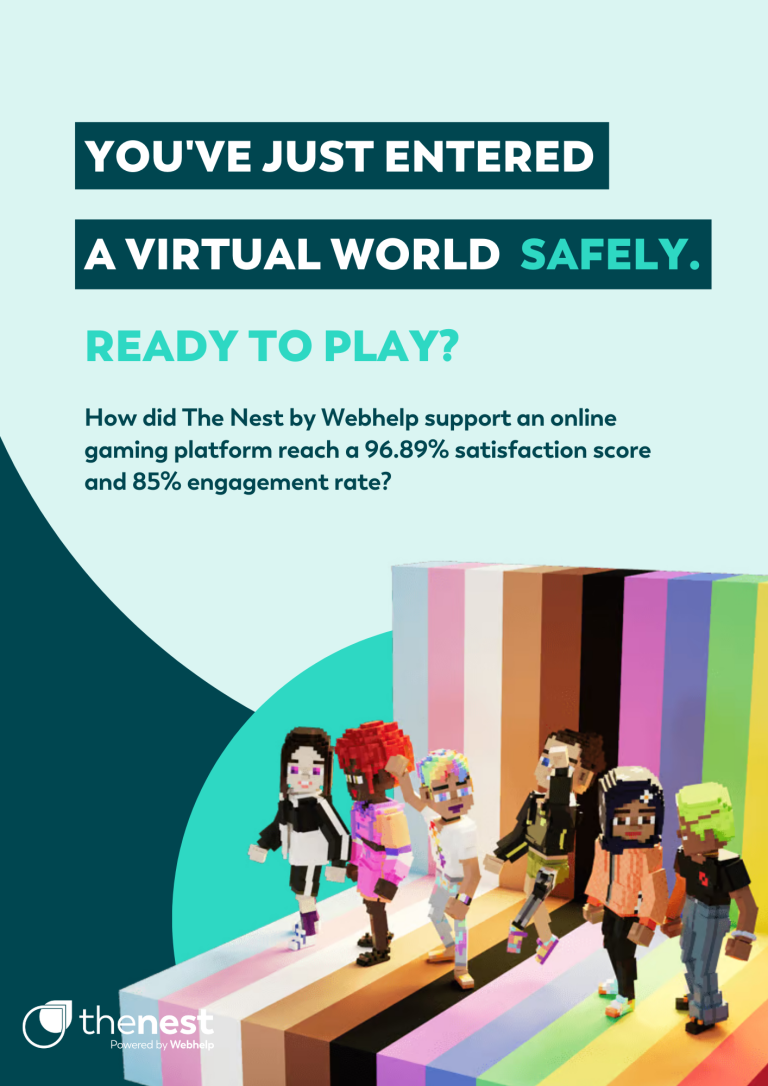In the ever-evolving realm of video games, player engagement and experience are central to a game’s success. Player engagement reflects the degree to which players are captivated, involved, and invested in a game. While factors like gameplay mechanics, graphics, and content updates influence engagement, the impact of player support and community management is often underestimated.
Player support holds a pivotal role in the gaming industry due to the unparalleled emotional attachment players develop towards games. In this context, the significance of effective player support cannot be overstated. When players confront challenges or technical hurdles, the expectation for swift issue resolution is paramount, whether facilitated by the game’s community or direct support channels. Neglecting to promptly address these concerns not only risks fostering frustration and dissatisfaction but also poses the potential to diminish player engagement and overall satisfaction levels.
By providing timely assistance and fostering a responsive environment, player support serves as a crucial bridge between players and game developers. It enhances the player experience by promptly addressing technical issues, answering inquiries, and facilitating a positive and supportive atmosphere. Player support not only resolves problems but also helps build a sense of community among players, enabling the exchange of feedback, suggestions, and experiences.

Furthermore, player support plays a pivotal role in crisis management during unforeseen situations, such as server outages or major bugs. Transparent communication and effective problem-solving during such events are instrumental in maintaining player trust and mitigating any negative impact on player retention.
In the realm of monetization, player support contributes to revenue generation by assisting players with transactions, refund requests, and payment-related matters. A seamless experience fosters confidence in the game’s monetization model and encourages continued player spending.
The pivotal role of player support becomes even more evident when considering the consequences of disengaged players. As mentioned earlier, failure to provide effective player support can lead to frustration, dissatisfaction, and diminished engagement. Let’s delve deeper into the potential outcomes of player disengagement and how player support can help mitigate these challenges.
Having disengaged players can have several negative consequences for a game, affecting both its short-term and long-term success. These consequences include:
When comparing player support in the video game industry with customer support in other sectors, there is significant room for improvement. While exceptions and variations exist, several general observations can be made:

The amalgamation of player expectations and the complex nature of game support, coupled with the lower priority given to it by many video game companies, has given rise to what’s known as the “Player Experience Gap.” Addressing this gap is more than a luxury. In the fiercely competitive video game industry, negative player experiences contribute to player disengagement, subsequently leading to player churn and other detrimental effects. With a plethora of gaming options and constant new releases, players have ample alternatives to choose from.
Having a robust and engaged community can bridge the player experience gap by addressing the challenges posed by player disengagement. A thriving community offers players a sense of belonging and connection, creating a positive and supportive environment that counters the negative effects of disengagement. Through proactive communication, transparent updates, and responsive interaction, game companies can build player trust and involvement, mitigating the negative repercussions of inadequate support.
The community acts as a buffer, enhancing player satisfaction, reducing frustration, and ultimately fostering a stronger emotional attachment to the game. By actively involving players in decision-making, valuing their feedback, and fostering a sense of ownership, the community becomes a driving force that aligns player expectations with the complex nature of game support, effectively narrowing the player experience gap and contributing to a more harmonious and fulfilling player journey.
Adopting a proactive approach to build a healthy, lively community is therefore no longer a nice-to-have.
Below are some of the main reasons to do so:
By promoting respectful communication, setting clear guidelines and enforcing them consistently, companies create a welcoming and inclusive environment. Proactively addressing toxic behavior, harassment or bullying ensures that players feel safe and supported, encouraging healthy interactions and stronger community bonds.
When openly communicating updates, changes, and upcoming features, companies keep players informed and engaged. Sharing development insights, conducting regular Q&A sessions, and addressing concerns demonstrate a commitment to transparency. Such openness leads to trust, allowing players to feel valued and involved in the game’s evolution.
Creating dedicated channels for feedback, such as forums and social media platforms, encourages players to voice their opinions and suggestions. Moreover, through listening to player feedback and responding promptly, companies demonstrate that they value the community’s input. Involving players in decision-making processes, such as beta testing or feature voting, empowers them and reinforces the sense of community ownership.


By closely monitoring the community and proactively identifying potential problems, companies can take appropriate action to prevent negative experiences. Timely responses to technical issues, bug fixes, and addressing concerns promptly help maintain a positive perception of the game and the company’s commitment to player satisfaction.
Tournaments, contests, or live streams provide opportunities for players to interact, showcase their skills, and engage with both the game and the community. Regularly scheduled events and interactions build anticipation and excitement, fostering a lively and active community that keeps players connected and invested.
Building and nurturing such a lively community around your game – and potentially around the world – is easier said than done. It requires a team of passionate people that fully understand the mechanics of your game, and who have the ability to empathize with your global player base.
While the video game industry continues growing, the demand for talented individuals with a passion for gaming continues to rise, leading to a war for talent.
Even though there are more than 3 billion people that play games worldwide, gaming companies struggle to attract talent, and with the growth of online communities this is even more so the case for community-related roles.
Good community moderators possess a unique set of skills that enables them to effectively manage and engage with the gaming community. Some of the key characteristics that make a good community moderator:
Community moderators need to convey information clearly, engage with players in a friendly and professional manner, and respond to inquiries and feedback effectively. Clear and concise communication helps build trust and rapport within the community.
A community moderator needs to have a deep understanding of gaming culture, including knowledge of trends, terminology, and gaming platforms. They should be familiar with the nuances and preferences of the game and the gaming community they are managing, allowing them to engage authentically.
Community moderators interact with players with diverse backgrounds, experiences, and opinions. Demonstrating empathy towards player concerns, understanding their perspectives, and responding with patience and understanding helps foster a positive community atmosphere.
Community moderators are often faced with issues and conflicts within the community. They need strong problem-solving abilities to address these issues effectively. By providing guidance and mediating conflicts, moderators help to maintain a harmonious community.

Community moderators are responsible for enforcing community guidelines and policies. They need to have a deep understanding of these guidelines to ensure fair and consistent moderation. Moderators must navigate complex situations, such as inappropriate behavior and harassment, so it’s very important to be on top of things to contain any toxic behavior.
Community moderators need to be aware of cultural differences, avoid biases or assumptions, and create an environment where all community members feel welcome and respected. Embracing diversity is crucial to building an inclusive gaming community.

Advancements in technology have reshaped player support in the gaming industry, with tools like chatbots, self-service platforms, and data analytics revolutionizing player engagement. The emergence of Generative AI (GenAI) presents new avenues to elevate player support:
In the realm of player support, striking a harmonious balance between technology, particularly Generative AI (GenAI), and the human touch is imperative. Over-reliance on automation can lead to frustration for both players and support representatives. Effectively adopting GenAI necessitates strategic integration, leveraging it for routine queries, instant responses, and interactive troubleshooting.
This involves training GenAI with accurate player interactions, ongoing monitoring, and fine-tuning based on feedback to optimize performance. Ensuring a seamless transition to human support for complex issues, transparent communication with players about AI capabilities, and robust data security measures collectively amplify gaming companies’ ability to swiftly resolve issues and enhance the player experience. Embracing this synergistic approach confers a competitive edge, ultimately driving improved player satisfaction in the dynamic gaming landscape.
An outsourcing company can help bridge the player experience gap by providing specialized expertise and resources to enhance player support and community engagement efforts.
We, at The Nest by Webhelp are the ideal BPO match for your gaming platform. With our expertise and dedication, we can lighten your workload and pave the way for remarkable progress and success.
We’ve already supported the growth of some of the most exciting startups in the gaming industry.
Find out: How the The Nest by Webhelp supported an online gaming platform reach a 97% satisfaction rate and 85% engagement rate.
